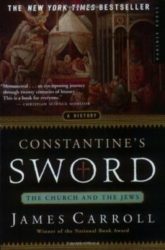 There’s a lot we’re not taught about the history of the Jews. Honestly, there’s not a lot we’re taught about history in general. I knew the Crusades were a religious war; the most I know of the Spanish Inquisition is from Monty Python. It wasn’t until recently that I even knew the extent of Roman rule in Israel during Jesus’s time. Sunday-school–aged children like myself wondered why Pilate was even there, or did they cart Jesus back and forth to Rome?
There’s a lot we’re not taught about the history of the Jews. Honestly, there’s not a lot we’re taught about history in general. I knew the Crusades were a religious war; the most I know of the Spanish Inquisition is from Monty Python. It wasn’t until recently that I even knew the extent of Roman rule in Israel during Jesus’s time. Sunday-school–aged children like myself wondered why Pilate was even there, or did they cart Jesus back and forth to Rome?
Constantine’s Sword digs into that history, proving the undercurrent of Catholic antisemitism from the Passion to the Holocaust. It’s a dense piece of work. It took me four months to finish. But in the end, I’m left… unsettled. The history of Jew-hatred is enough to unsettle, but that wasn’t the part that stuck out to me. The author, a former Catholic priest, has some issues with the Church he can’t put aside. I wonder what’s truly historically accurate, and what’s colored by his personal bias.
I don’t deny there was some shady business in the Church regarding other religions, especially the Jews. Even the Gospels point at “The Jews” as the murders of Jesus, an accusation that sparked anti-Judaism throughout history. (This ignores the obvious Jewishness of Jesus and his Mother, which is often left out of the story.) Over time, this negative opinion brings worse and worse consequences. Jews are exiled from countries countless times; they’re blamed for the Black Plague; they’re forced into ghettos. I didn’t even know of the Roman ghetto before reading this book. Sometimes popes stand up for them, and sometime they don’t. We like the think the Holocaust was the last straw, but it wasn’t. Antisemitism still runs wild.
But near the end, the author starts to get more opinionated than factual. The last section is titled “A Call for Vatican III,” a conclusion of what the Church should do to make up for its sins and be more inclusive. It includes things I do agree with, like fostering better relations between Catholic and Jews. But a lot of these “suggestions” miss the mark. The right for priests to marry? The church as a democracy? A call for sola scriptura? If this is what you want of church, you’re not Catholic. He completely misses the mark of Catholicism, which makes me question his historical research. What’s fact, and what’s bias? It’s an interesting read for the history of Catholic/Jewish relations, but I’m not sure how much of the details I can believe.
